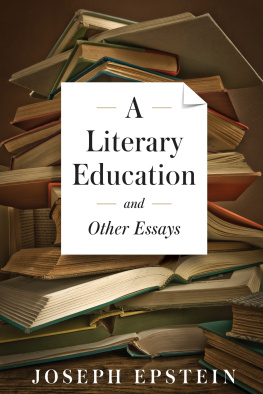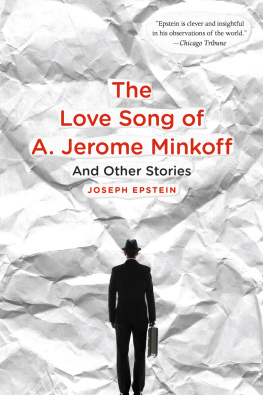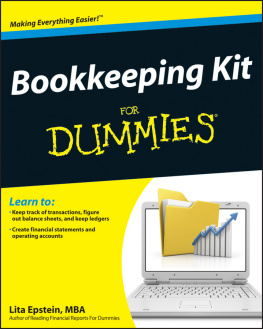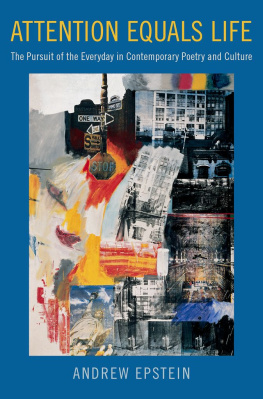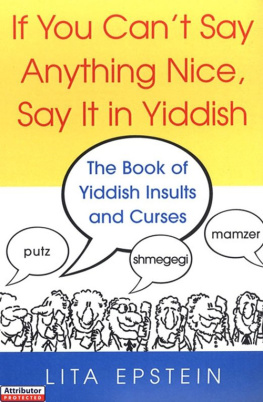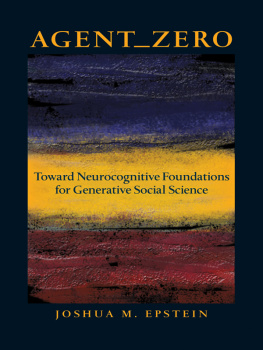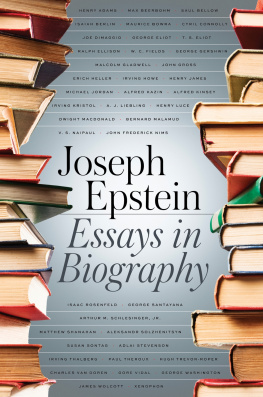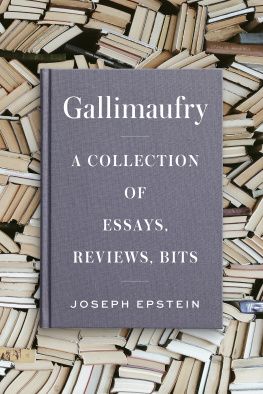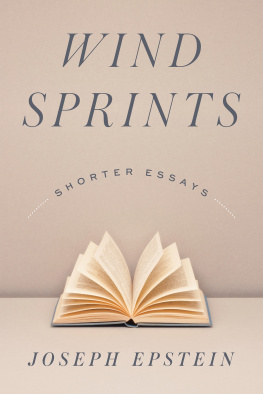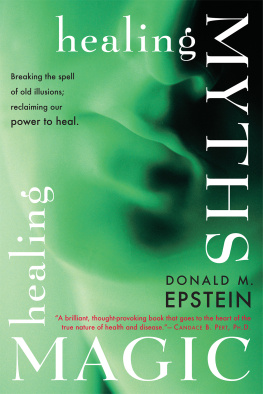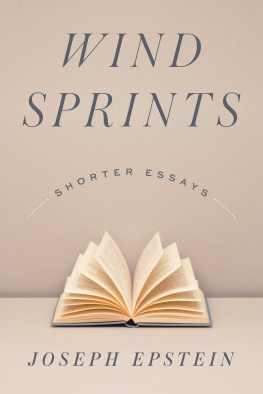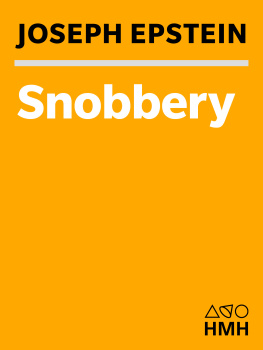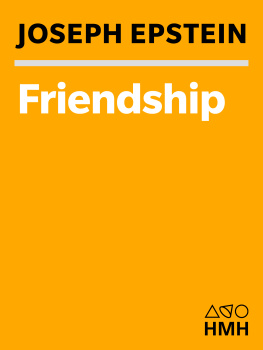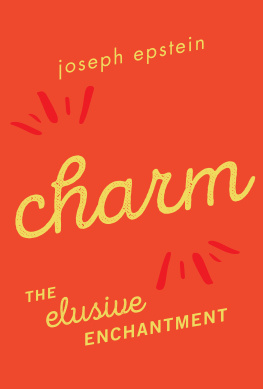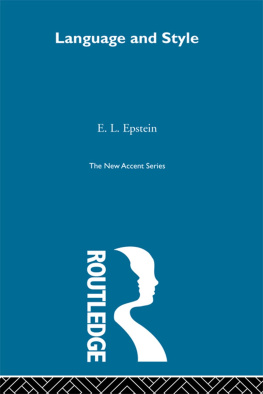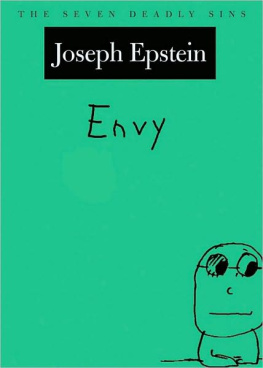The Love Song of A. Jerome Minkoff and Other Stories (2010)
Introduction
A Literary Education is my thirteenth collection of essays. The first, Familiar Territory , was published by Oxford University Press in 1979. Initially my essay collections were divided between what I thought of as literary essays and familiar essays; the former were essays about other writers, the latter about the world at large, or at least those things in it that captured my fancy at the time. Most of these essays originally appeared in intellectual magazines. I have been privileged in having magazine editors ask me to supply them with essays, and even more privileged in having had a generous response to these essays from readers. As an essayist, I am quite without complaint, which hasnt been easy for someone with a naturally complaining nature.
I have also been fortunate in the criticism my essays have encountered. I have taken my knocks and occasional smashes, but far and away most of this has been kindly and generous, and some of it has come from writers I myself much admired: Philip Larkin, Karl Shapiro, and John Gross, William Barrett, Sidney Hook, and J. F. Powers, to name only the dead among them. I have been compared to great essayists, to Michel de Montaigne, Charles Lamb, William Hazlitt, Max Beerbohm, and H. L. Mencken. I have been praised lavishly, called the best essayist writing in English, though, true enough, often with the word arguably qualifying this praise (Arguably Epstein is...). I have read so often sentences that begin Arguably Epstein is ... that I have contemplated changing my name from Joseph to Arguably Epstein. As for the attacks on my essays, I have been able to take comfort in the fact that most have seemed to me unjust; and in the matter of literary criticism, as Mencken once remarked, it is only justice that hurts.
As for my own opinion of my quality as an essayist, it is simple enough, and comes down to the feeling that I could have done a lot better. I fear it is in the nature of writing always to feel that one could have done better, though sometimes I have reread an essay of mine written twenty or thirty years ago and think it not utterly disgraceful. Paul Valery, who said so many smart things about writing, claimed that he never finished a poem; he merely abandoned it. By which he meant that even after long labor he could not discover ways to make the poem as good as he hoped it might be. So it is for every writer who values craft, and thinks the badge of craftsman, even with its artisanal ring, among the highest of compliments.
An essayist is an amateur, in two primary senses of the word. He is, first, distinctly not an expert; and he is, second, a lover. Unlike the critic, or even the novelist or poet, there is nothing professional about the essayist. He comes to the world dazzled by it. The riches it offers him are inexhaustible. Subjects on which he may scribble away are everywhere. The essayist need not be an optimist, but a depressed essayistand I can provide names of some now at work on requestis badly miscast.
At the same time, the essayist ought to be skeptical if not gloomy in outlook. He should distrust large ideas, and especially idea systems. He should view all theories as mistaken until proven true, which over the centuries not all that many have. Life for the essayist is so much richer, so much more various, than any theory or even idea can hope to describe. The best essayists, in my reading, are the laughing skeptics.
This is the second book of essays that I have published with Axios Press. Four or so years ago I received an email from Hunter Lewis, the founder of Axios, thanking me for the pleasure my essays have given him over the years and offering to print any essays of mine that have not previously appeared in earlier of my books that I deemed worth reprinting. Talk about an email that made my day. A man of his word, Hunter Lewis brought out a volume of my essays to which he suggested the title, after Lord Keynes, of Essays in Biography . His firm also produced far and away the handsomest of all the twenty-odd books I have thus far had published.
A Literary Education , the second Axios volume, is not united by the biographical or any other theme but instead covers the range of my interests and preoccupations as an essayist over a writing career that spans more than fifty years: education, language, the arts, magazines, intellectuals, the culture. Whether, taken together, the essays in this volume comprise a consistent and interesting outlook on the life of my time is not for me but for my readers to say.
I published my first essay, A Stillness at Little Rock in the New Leader Magazine in 1959 at the age of twenty-two. A publishing scoundrel, in Henry Jamess phrase, I have scribbled away continuously ever since. The most recent essay in this book, You Could Die Laughing, appeared in 2013. If my luck continues to hold up, I hope to be able to publish further essays after this book makes its entrance into the world.
Luck is the right word, for, as I look back upon my career, it has been one of great good fortune. By my early thirties I had jobsediting a magazine, teaching at a university without having any advanced degrees that allowed me lots of free time for writing. I have never suffered anything like a writers block. (Pause here to touch wood.) I have at one time or another written for all the notable magazines in this country and in England. I have had no difficulty getting books published by reputable publishers. I have not made vast sums of money through my writing, certainly not enough to gain me an honorable discharge from the financial wars, but it has provided me with a decent income over the past forty or so years. Best of all, I have acquired a small but hardy band of regular readers who fortify me and encourage me to persist. They, these readers, are the greatest reward of all.
Joseph Epstein
Part One
A Literary Education
A Literary Education: On Being Well-Versed in Literature
(2008)
S ydney Smith, the early-nineteenth-century clergyman, wit, and one of the founders of the Edinburgh Review , once remarked that, if the same progress as had been made in education were made in the culinary arts, we should today still be eating soup with our hands. Quite so. Sydney Smiths simile holds up all too well in our time. New ideas and reforms continue to crop up in educationfrom the installation of the elective system more than a century ago at Harvard to the advent of digital technology throughout the educational system in recent yearseach, in its turn and time, heralding fresh new revolutions in learning. One after another, these revolutions fizzle, then go down in flames, leaving their heralds all looking like some variation of what Wallace Stevens called lunatics of one idea.

